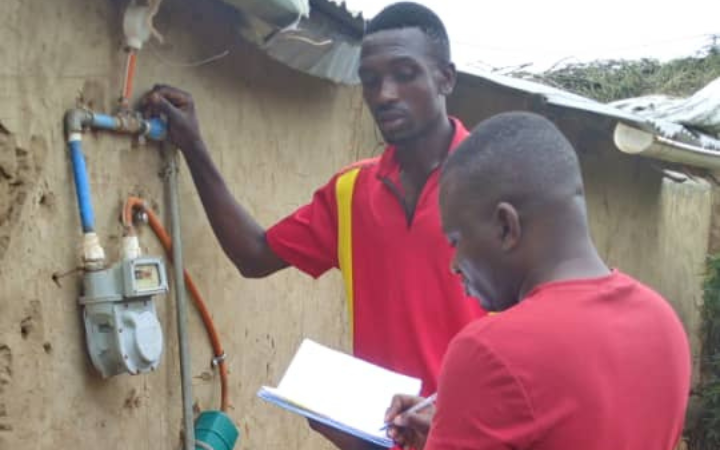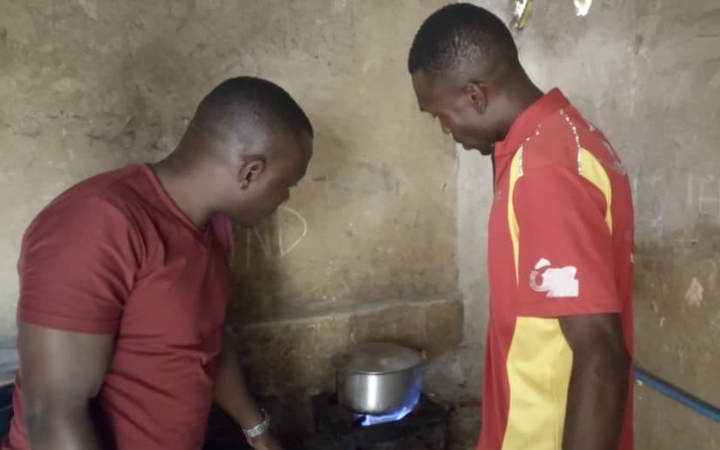26 June 2023, Isingiro, Uganda - In March 2023, Epa conducted fieldwork in Nakivale Refugee Settlement in Uganda, shedding light on the challenges of energy access. Due to population growth and widespread deforestation, refugees and host communities face significant hurdles in accessing fuels to cook. While innovative solutions like biogas cooking systems offer some hope, the overall situation remains dire. More work is needed to support sustainable energy access for refugees and host communities. Epa explains how crucial innovations in cooking systems are in order to implement SDG 7 for “Affordable and clean energy” in displacement contexts.
“On 20 March 2023, I arrive at Nakivale Refugee Settlement to conduct research for the Roadmaps for Energy Access in Displacement Settings (READS) programme. It's been four years since I was last here. The state of the hills and valleys that make up Nakivale show that the population has tremendously increased, with trading centres everywhere and deforestation visible wherever I look.
I vividly remember 22 years ago when I first arrived in Nakivale as a refugee. Thick forests were everywhere, forest vegetation was green and abundant, and my childhood friends and I wandered around in the forests to collect deadwood for household cooking. My childhood firewood adventures would be impossible now: there is no more deadwood to harvest for cooking needs, nor live trees to cut for charcoal and firewood.
Cooking has become a nightmare and people need to cross the border into Tanzania to fetch charcoal. This poses a great security threat to the point of risking one’s life. As Nakivale residents struggle to find means to cook, some of them have taken matters into their own hands. One refugee group has developed a biogas cooking system that provides 45 households with cooking energy, lighting, and phone charging.
Nyabenda, the proprietor, speaks passionately about the innovation and how it has the potential to solve the cooking needs of many households in the settlement with affordable and clean energy. He also speaks of its potential challenges, such as a lack of water and cow dung to refill the system and high upfront costs. But he thinks they can be overcome if groups come together and have a little external support. He says his focus is to solve the cooking nightmare that many of his fellow refugees face.
On the other hand, UNHCR and Nsamizi, a Ugandan NGO, are working hard to provide cooking solutions but their efforts are far from reaching the required levels. Due to resource constraints, they can only reach the ‘Extremely Vulnerable Individuals (EVIs)’ with bio-briquettes and improved cookstoves. This means that the majority are left without improved cooking means and must support themselves. Nakivale’s Base Camp has recently been connected to the national grid and a few households have access to it. However, due to high tariffs, even those with grid access can only use it for less energy-intensive uses like charging electronic devices and lighting. This is a familiar story to that of urban refugees in Kampala, who shared that national grid tariffs are too high for many people.
While some people know about improved cooking solutions like e-cooking, others have had little or no exposure to them or think that they are only for rich people because of their high upfront costs. Interviewees in Kampala shared that they have shifted from charcoal to electric cooking but have not seen any difference in expenditure. This is promising but will need further investigation to explore the true potential of e-cooking.
Energy deficiency is evident everywhere in Nakivale. The environment is visibly crying, pockets are being emptied and organisations which provide support like UNHCR, OPM, Nsamizi, and other partners are resource-stretched. The situation is alarming and yet people have always found a way to cook, no matter how hard it is or how detrimental it is to the environment. Prices of charcoal and firewood have skyrocketed, and they will not be going down soon.
Tanzania, now a source of charcoal, is also standing up to protect its environment. It is the battle for survival versus the battle to save the environment. If it is going to be won, we’re going to need clean energy swords: in fact, a lot of swords. After four days with residents and leaders of Nakivale Refugee Settlement, I leave wondering how things have changed. What used to be a childhood adventure looking for firewood has turned into a life-threatening search for people to meet basic needs and survive in another country, but it shows that innovating is critical to allow people to access affordable and clean energy.”
Epa Ndahimana



